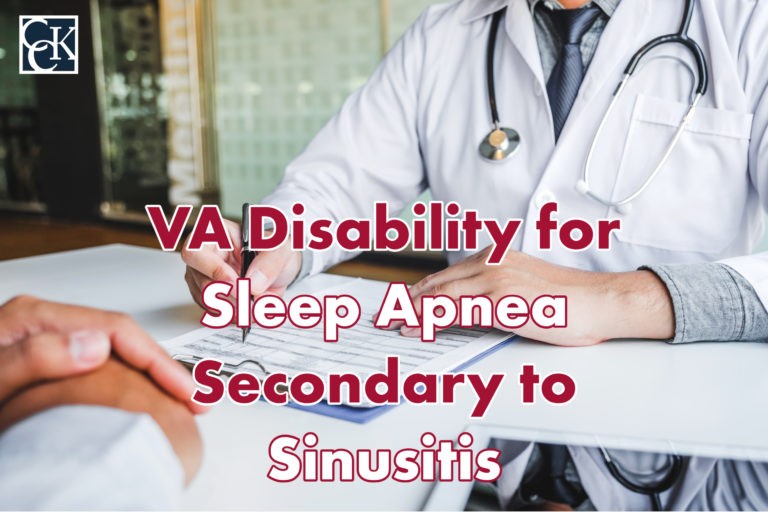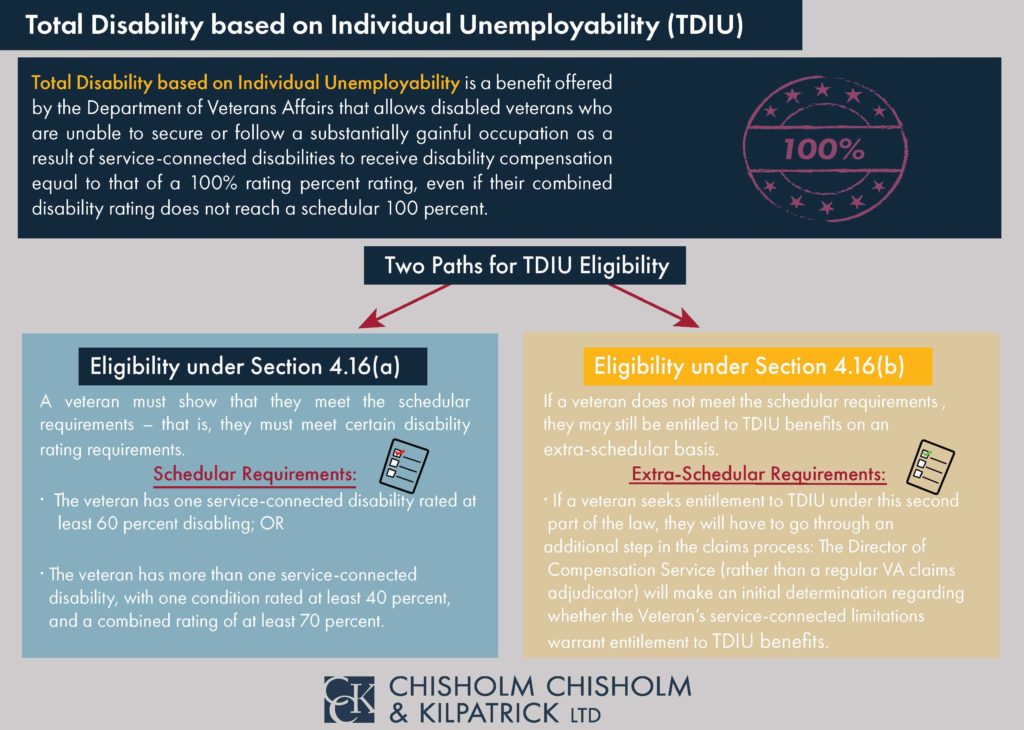VA Disability for Sleep Apnea Secondary to Sinusitis

CCK Law: Our Vital Role in Veterans Law
What is Sleep Apnea?
Sleep apnea is sleep disorder that affects a person’s breathing during the course of the night. Generally, there are three types of sleep apnea:
- Obstructive Sleep Apnea – the most common form of sleep apnea; occurs when the throat muscles intermittently relax and block your airway during sleep
- Central Sleep Apnea –occurs when your brain does not send the proper signals to the muscles that control breathing
- Complex (Mixed) Sleep Apnea Syndrome –occurs when someone has both obstructive sleep apnea and central sleep apnea
Signs and Symptoms of Sleep Apnea
The signs and symptoms of these three types of sleep apnea tend to overlap, sometimes making it difficult to determine which type you have. Symptoms can include:
- Loud snoring
- Gasping for air during sleep
- Awakening with a dry mouth
- Morning headache
- Hypersomnolence, or excessive daytime sleepiness
- Difficulty concentrating
Diagnosing Sleep Apnea
To confirm a sleep apnea diagnosis for VA disability compensation purposes, VA requires that a sleep study be conducted.
If you have previously been diagnosed with sleep apnea, but have not undergone a sleep study, VA will not consider that diagnosis enough evidence to verify eligibility for compensation.
Treating Sleep Apnea
For mild cases of sleep apnea, doctors may suggest lifestyle changes such as losing weight or quitting smoking, if applicable.
In more serious cases, doctors may prescribe the use of a continuous positive airway pressure (CPAP) machine. A CPAP machine delivers air pressure through a mask while you sleep that is somewhat greater than that of the surrounding air. This allows your upper airway passages to remain open, thereby preventing apnea and snoring.

What is Sinusitis?
Chronic sinusitis occurs when the spaces inside your nose and head (i.e., sinuses) are swollen and inflamed for three months or longer, despite treatment. This condition is rather common and typically interferes with the way mucus drains, causing your nose to be stuffy. As such, breathing through your nose may be difficult, and the area around your eyes might feel swollen or tender.
Symptoms of Sinusitis
Common signs and symptoms of sinusitis include:
- Nasal inflammation
- Thick, discolored discharge from the nose
- Drainage down the back of the throat (postnasal drainage)
- Nasal obstruction or congestion, causing difficulty breathing through your nose
- Pain, tenderness, and swelling around your eyes, cheeks, nose, or forehead
- Reduced sense of smell and taste
- Ear pain
- Aching in your upper jaw and teeth
- Cough or throat clearing
- Fatigue
Chronic sinusitis and acute sinusitis have similar symptoms, but acute sinusitis is a temporary infection of the sinuses often associated with a cold. As such, it is not as debilitating and typically resolves on its own. Common causes of chronic sinusitis may include the following:
- Nasal polyps – tissue growths that block the nasal passages or sinuses
- Deviated nasal septum – a crooked septum (i.e., the wall between the nostrils) may restrict or block sinus passages
- Respiratory tract infections – infections in your respiratory tract can inflame and thicken your sinus membranes and block mucus drainage
Veterans may develop this condition as a result of their military service, in which case they may be entitled to VA disability benefits.
How are Sleep Apnea and Sinusitis Connected?
Sleep apnea and sinusitis share many of the same symptoms, such as snoring and difficulty breathing. While there are several similarities between the conditions, further research needs to be done to fully understand the link between the two. However, the symptoms of sinusitis can make it more difficult to breathe while sleeping, which can make a person more likely to develop sleep apnea.
Service Connection for Sleep Apnea and Sinusitis
To file any claim for VA disability benefits, veterans will generally first need to become service connected. When seeking service connection, veterans will generally need to submit the following to VA:
- A current diagnosis of a condition;
- An in-service event, illness, or injury; and,
- A medical nexus linking the veteran’s condition to the in-service event
Veterans can submit their claim using VA Form 21-526EZ. The form can be submitted to VA in the following ways:
- Online – using VA’s eBenefits platform
- By mail – directed to the Department of Veterans Affairs, Evidence Intake Center, PO Box 4444 in Janesville, WI 53547-4444
- In person – bringing a completed VA Form 21-526EZ to a VA Regional Office near you
- With a legal representative – completing the form with a Veterans Service Organization (VSO) or a VA accredited agent or attorney
Secondary Service Connection
Once a veteran is service connected for a condition, they may wish to apply for secondary service connection. Secondary service connection is a form of service connection for conditions which are caused or aggravated by another, already service-connected, condition.
To establish secondary service connection, the veteran generally needs to submit the following to VA:
- A current diagnosis of a condition secondary to a primary service-connected condition
- Medical evidence showing the relationship between the primary condition and the secondary condition
Essentially, with secondary service connection, the veteran does not need to provide evidence of an in-service event or stressor, but rather only needs to provide evidence that the secondary condition is linked to the primary one.
Presumptive Service Connection
Presumptive service connection places less of the burden of proof on the veteran to prove the nexus between their condition and their military service. Essentially, if a veteran has been diagnosed with a presumptive condition, and meets the criteria outlined, they should be granted presumptive service connection.
In August 2021, VA established presumptive service connection for certain veterans who were diagnosed with chronic sinusitis due to particulate matter exposure during military service. Then, in August 2022, chronic sinusitis was added to the presumptive list for toxic exposure established by the Honoring Our Promise to Address Comprehensive Toxics (PACT) Act of 2021. This expanded the parameters for presumptive service connection for chronic sinusitis.
Veterans – referred to as “covered veterans” – are eligible for presumptive service connection for chronic sinusitis under the PACT Act if they served in one of the following locations and time periods:
- A veteran who, on or after August 2, 1990, performed active military, naval, air, or space service while assigned to a duty station in, including air space above:
- Bahrain
- Iraq
- Kuwait
- Oman
- Qatar
- Saudi Arabia
- Somalia
- United Arab Emirates
- A veteran who, on or after September 11, 2001, performed active military, naval, air, or space service, while assigned to a duty station, including the airspace above:
- Afghanistan
- Djibouti
- Egypt
- Jordan
- Lebanon
- Syria
This presumption also applies to surviving spouses of veterans seeking retroactive Dependency and Indemnity Compensation (DIC) benefits.

VA Ratings for Sleep Apnea
Sleep apnea is rated under 38 CFR § 4.97, Diagnostic Code 6847 – Sleep Apnea Syndromes (Obstructive, Central, Mixed). Veterans are assigned a 0, 30, 50, or 100 percent VA rating based on the severity of their condition. The current VA rating criteria for sleep apnea are as follows:
- 100% – The veteran has chronic respiratory failure with carbon dioxide retention, requires a tracheostomy, or has cor pulmonale (i.e., the enlargement or failure of the right side of the heart due to lung disease.)
- 50% – The veteran requires the use of a breathing assistance device, such as a CPAP machine.
- 30% – The veteran is experiencing persistent daytime hypersomnolence (i.e., a condition characterized by chronic daytime sleepiness that does not improve even with sufficient sleep).
- 0% – The veteran has a documented sleep disorder, but their condition is currently asymptomatic (i.e., not producing symptoms). Although considered non-compensable, the veteran may still qualify for other benefits, such as VA health care.
VA Ratings for Sinusitis
VA rates chronic sinusitis under 38 CFR § 4.97 according to the General Rating Formula for Sinusitis (Diagnostic Codes 6510 through 6514). The criteria are as follows:
- 50% – Following radical surgery with chronic osteomyelitis, or; near constant sinusitis characterized by headaches, pain and tenderness or affected sinus, and purulent discharge or crusting after repeated surgeries
- 30% – Three or more incapacitating episodes per year of sinusitis requiring prolonged (lasting four to six weeks) antibiotic treatment, or; more than six non-incapacitating episodes per year characterized by headaches, pain, and purulent discharge or crusting
- 10% – One or two incapacitating episodes per year of sinusitis requiring prolonged (lasting four to six weeks) antibiotic treatment, or; three to six non-incapacitating episodes per year characterized by headaches, pain, and purulent discharge or crusting
- 0% – Detected by X-ray only
Importantly, an incapacitating episode of sinusitis refers to one that requires bed rest and treatment by a healthcare professional.
Compensation and Pension Exams for Sleep Apnea and Sinusitis
If a veteran files a claim for service connection, or secondary service connection, VA may request a compensation and pension exam (C&P). The purpose of a C&P exam is two-fold: to assess whether service connection is warranted, and to gather evidence to award a VA disability rating if service connection is granted.
The C&P exam will be performed by a VA examiner or a VA-contracted examiner. They may physically examine the veteran, if applicable, or interview the veteran regarding their service, or their sleep apnea or sinusitis. They may also ask about the link between the veteran’s sleep apnea and their sinusitis.
It is important to attend any C&P exams that VA requests, even if they request two exams: one for sleep apnea and one for the sinusitis. Though the exams may seem redundant, it is crucial that the veteran attends because VA may deny the claim if they do not. If the veteran must miss a C&P exam, they should contact VA as soon as possible to try to reschedule.
TDIU, Sleep Apnea, and Sinusitis
TDIU, or total disability based on individual unemployability, is a monthly VA benefit that compensates veterans at the 100 percent level if they are prevented from working because of their conditions.
In order to be eligible for Schedular TDIU, veterans must have one condition rated at 60 percent minimum OR two conditions that can be combined to reach 70 percent, where one condition is at minimum 40 percent. As such, secondary service connection can be extremely helpful in boosting veterans to the 70 percent minimum needed for multiple conditions to achieve TDIU. The criteria for schedular TDIU is outlined under 38 CFR § 4.16a.

A veteran’s secondary service connection ratings for either sleep apnea or sinusitis can contribute to a veteran’s overall combined rating. For example, if a veteran is service connected for sinusitis at 50 percent for sinusitis and secondary service connected for sleep apnea at 30 percent, then they would meet the criteria for schedular TDIU.
Veterans who do not meet the necessary criteria for schedular TDIU may be eligible for extraschedular TDIU. For this form of TDIU, veterans must prove that their condition(s) uniquely hinders their ability to maintain substantially gainful employment. Extraschedular TDIU is rated under 38 CFR § 4.16b.
Need Help with Your VA Disability Benefits for Sleep Apnea Secondary to Sinusitis?
Establishing secondary service connection for sleep apnea secondary to sinusitis can be tricky. These claims can be wrongly denied, especially if VA does not consider all the evidence. If your claim for sleep apnea secondary to sinusitis has been denied, the veterans’ advocates at Chisholm Chisholm & Kilpatrick may be able to help. Our team has proven success helping veterans win the benefits they deserve for sleep apnea relating to sinusitis. Call our office today for a free case evaluation.
About the Author
Share this Post
